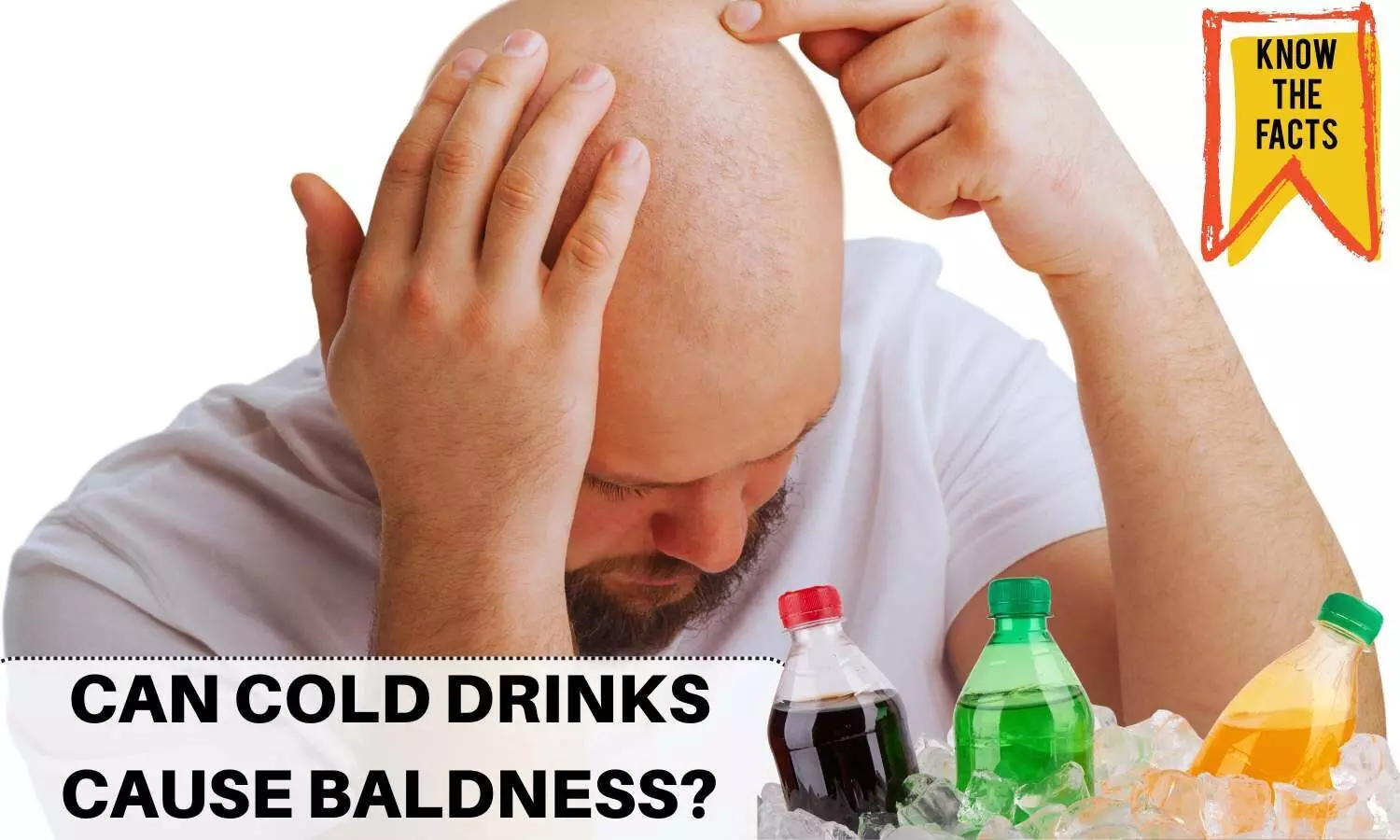Fact Check: Can cold drinks cause baldness?

Claim: A reel on Facebook claims that drinking excessive cold drinks can lead to baldness. It states that cold drinks are nothing but carbonated water and it does not let nutrition reach the scalp. The post recommends drinking sugarcane juice, buttermilk, sattu (roasted chick pea flour) as healthier alternatives. The reel has over 3 thousand views and can be accessed here.
Fact Check: HALF TRUE
What is androgenetic alopecia?
Androgenetic alopecia or male pattern hair loss is a genetically predetermined disorder due to an excessive response to androgens. This condition affects up to 50 percent of males and females and is characterized by progressive loss of terminal hair of the scalp any time after puberty. (1)
What are the primary factors that contribute to early baldness?
Hair loss is multifactorial, with genetics, hormones, and health conditions playing significant roles. Major causes can be:
Genetic: Family history plays a significant role in male pattern hair loss. It tends to be more common if relatives on either side of the family have experienced hair loss.
Hormones: Androgens, especially dihydrotestosterone (DHT), play a key role in male pattern hair loss. DHT shrinks hair follicles, resulting in shorter and finer hair until hair growth stops completely.
Diet: Poor nutrition, including deficiencies in essential vitamins and minerals like biotin, zinc, and iron, can weaken hair health.
Dr Asha Zacharia, Consultant, Dermatology & Cosmetology, KIMSHEALTH, explains, “Hair loss is multifactorial. Studies have shown that high intake of sugar-sweetened beverages can cause hair loss. High sugar levels can cause scalp inflammation due to poor blood circulation, which leads to damaged hair. Elevated sugar levels can cause erratic hormonal levels. Sugars tend to raise testosterone levels in the blood, which can trigger hair loss. Carbonated drinks can interact with insulin in the blood and make it less responsive to sugars, leading to increased blood sugar and lower nutrient supply to the hair. Refined carbs, dairy, greasy food, alcohol, processed foods, and excess intake of vitamins like vitamin A and vitamin E can also cause hair loss.”
Can cold drinks cause baldness?
A study in the Journal Nutrients conducted by Tsinghua University in China found a potential connection between high consumption of sugar-sweetened beverages (SSBs) and male pattern hair loss (MPHL) in young men. Analysing data from 1,028 Chinese men, with an average age of 27.8 years, the study revealed that 57.6 percent experienced MPHL. The researchers suggest that high sugar intake can elevate serum glucose levels, activating the polyol pathway, which is associated with diabetes and may also be linked to hair loss. (2)
Another study published in Diabetes Care found that regular intake of SSBs, such as soft drinks, fruit drinks, iced tea, and energy drinks, significantly impacts insulin levels and sensitivity. Frequent consumption leads to rapid blood glucose spikes, causing the pancreas to release large amounts of insulin. Over time, this can result in insulin resistance and a higher risk of type 2 diabetes. A meta-analysis showed that high SSB consumption (1-2 servings per day) increases the risk of type 2 diabetes by 26% compared to low consumption (less than one serving per month). (3)
While direct research on carbonated drinks and hair health is limited, poor insulin sensitivity and high blood sugar can lead to nutrient absorption issues and circulation problems, indirectly affecting hair health. Nutrient deficiencies in vitamins and minerals essential for hair growth (like biotin, zinc, and iron) can lead to hair thinning and loss.
What do the experts say?
Medical Dialogues Final Take:
While the studies found an association between SSB consumption and MPHL, they do not prove a direct causal relationship. High consumption of sugar-sweetened beverages can indirectly contribute to hair loss through mechanisms such as blood sugar spikes, insulin resistance, and impaired nutrient absorption. These factors can negatively impact overall hair health.
Hence, this claim is HALF TRUE.
References:
1. Ho CH, Sood T, Zito PM. Androgenetic Alopecia. [Updated 2024 Jan 7]. In: StatPearls [Internet]. Treasure Island (FL): StatPearls Publishing; 2024 Jan-. Available from: https://www.ncbi.nlm.nih.gov/books/NBK430924/
2. Shi, X., Tuan, H., Na, X., Yang, H., Yang, Y., Zhang, Y., Xi, M., Tan, Y., Yang, C., Zhang, J., & Zhao, A. (2023). The Association between Sugar-Sweetened Beverages and Male Pattern Hair Loss in Young Men. Nutrients, 15(1), 214. https://doi.org/10.3390/nu15010214
3. Malik, V. S., Popkin, B. M., Bray, G. A., Després, J. P., Willett, W. C., & Hu, F. B. (2010). Sugar-sweetened beverages and risk of metabolic syndrome and type 2 diabetes: a meta-analysis. Diabetes care, 33(11), 2477–2483. https://doi.org/10.2337/dc10-1079



